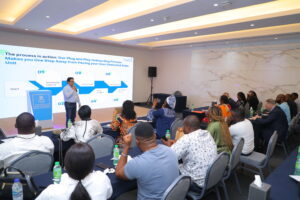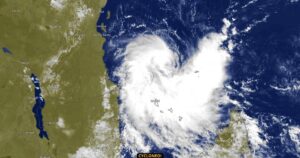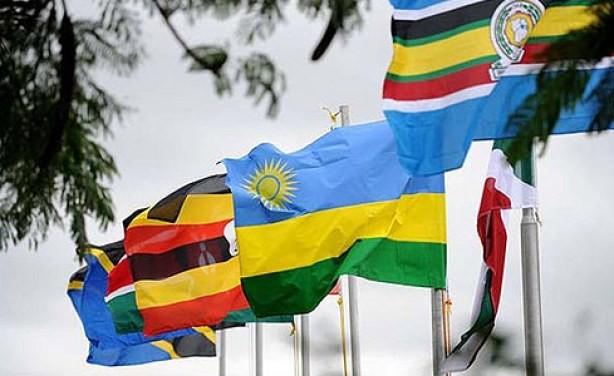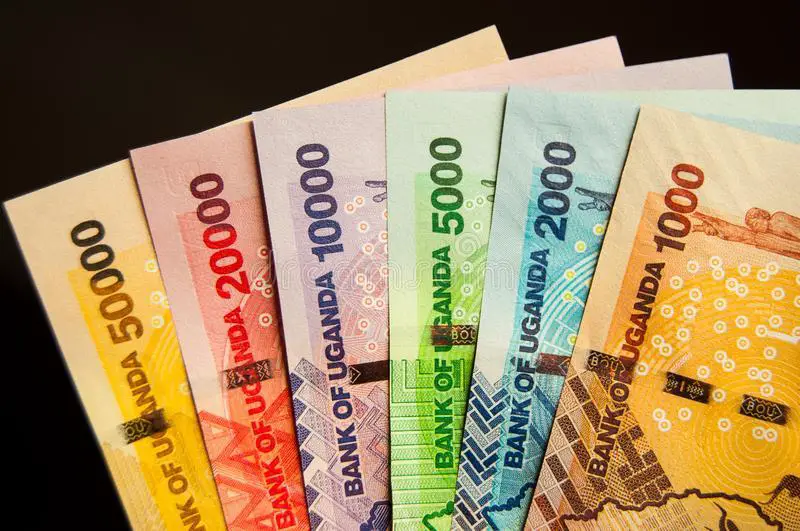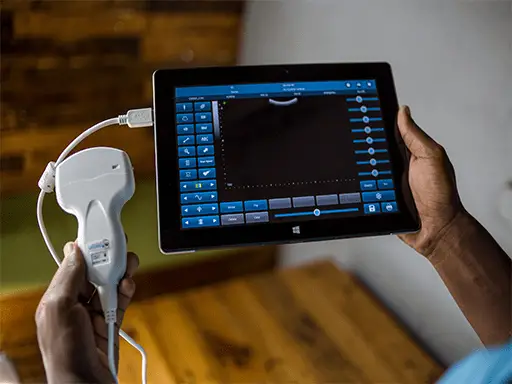- Partners back AIM Congress 2024 vision for global economic stewardship
- AIM Congress 2024: pre-event forums set the stage for strategic insights on global showcase
- Kenya, Tanzania braces for torrential floods as Cyclone Hidaya approaches
- EAC monetary affairs committee to discuss single currency progress in Juba talks
- Transport and food prices drive down Kenya’s inflation to 5% in April
- Payment for ransomware attacks increase by 500 per cent in one year
- History beckons as push for Kenya’s President Ruto to address US Congress gathers pace
- IMF’s Sub-Saharan Africa economic forecast shows 1.2 percent GDP growth
Author: Caroline Muriuki
Nigeria’s high food prices pushed annual inflation last month after borders with neighbouring countries were closed in a crackdown on smuggling.
In August, Nigeria closed parts of its borders to fight smuggling of rice and other goods.
The head of customs confirmed last month that all trade in goods through land borders had been halted indefinitely.
On Monday the National Bureau of Statistics said, Nigeria’s annual inflation was 11.61% in October a rise from 11.24% in September, noting that it is the highest rate since May 2018.
A separate food price index showed inflation at 14.09% in October, compared with 13.51% September.
“This rise in the food index was caused by increases in prices of meat, oils and fats, bread and cereals, potatoes, ham and other tubers, fish and vegetables,” said the statistics office in its report.
The chief economist for Africa and the Middle East at Standard Chartered, Razia …
Equity Bank is in the final stages of completing its takeover of the Banque commercial du Congo (BCDC).
The acquisition follows an agreement with the majority shareholder—George Arthur Forrest and family to acquire all the 625,354 shares (66.53 per cent) owned by the Belgian at a cost of $105 million.
The government of the Democratic Republic of Congo owns 25.53 per cent while other minority shareholders own the remaining 7.94 per cent shares.
The price of the transaction includes dividends declared after January 1, 2019, in respect of the financial year ending December 31, 2019, transpiring to dividend price per share of $ 167.9 per share.
In a statement, Equity Bank Chief Executive James Mwangi said the acquisition provides more motivation for it to push ahead with its 2024 dream of converting into a pan African bank.
“This is an opportunity for the Group to take further steps towards …
The value of intra-trade among East African Community (EAC) states increased to $5.98 billion in 2018 from $5.46 billion in 2017, accounting for a 9.4 per cent growth.
According to the East African Community Trade and Investment Report (2018), all EAC member states except for Burundi recorded growth in trade with their regional counterparts.
Uganda, Tanzania, Rwanda, South Sudan and Kenya’s combined exports to the East African Community and Southern African Development Community regions amounted to $3.1 billion and $1.9 billion in 2018 respectively showed a report prepared by the EAC Secretariat.
In 2015 and 2016, intra-EAC trade was in the negative zone. In 2018, Burundi’s total trade with other countries in the region fell by 11 per cent to $150.9 million from $162.6 million in 2017.
Kenya’s total trade with EAC partner countries rose to $1.95 billion in 2018 from $1.86 billion in 2017 an increase of 4.7 …
Africa needs cumulative investments of $2.6 trillion between 2019 and 2040 to meet the rising energy demand and provide more accessible facilities to citizens as the continent’s population expands report shows.
The International Energy Agency (IEA) released its Africa Energy Outlook 2019 report, in which it said that Africa is experiencing the fastest progression of urbanisation in the world. While accounting for half of the global increase, the report said that Africa’s overall population is projected to expand by 600 million before 2040.
According to the report, the shifts will drive the continent’s economic growth, infrastructure development and energy demand, which is predicted to rise by 60 per cent.
“While this energy gap remains a significant barrier to Africa’s sustained economic development, it inversely presents several opportunities for many African nations such as current advancements in the liquefied gas (LNG) market, potential for realising onshore value, while simultaneously driving …
Egypt’s foreign trade in the fiscal year (FY) 2018/19 reached $95.024billion from $88.93billion in year 2017/18, an increase of $6.094 billion according to the Central Bank of Egypt (CBE).
According to a report by the Central Bank of Egypt, the country’s imports reached about $66.53 billion against $35.560billion, while its exports reached $28.495billion against $16.347billion, in the same period.
According to the CBE report, 14 countries accounted for 62.3% of Egypt’s foreign trade, with the value of trade exchange between Egypt and those countries amounting to $59.245billion.
The bank pointed out that Egyptian exports to these countries reached $17.091billion which is equivalent to 60% of total exports. Its imports from these 14 countries reached $42.153billion, which is about 63.4% of total imports between July 2018 and June 2019.
China was Egypt’s largest trade partner with a $6.505billion trade exchange, including $6.012billion worth imports and $493.2m worth exports. The United States…
Rwanda’s debt rose to $5.4 billion last year from $4.8 billion in 2017, World Bank data shows.
Rwanda’s debt level this year is projected to rise to 49.1 per cent as a ratio of GDP, from 40.7 per cent last year.
According to the Ministry of Finance, much of the country’s debt is Long-term, with a repayment period of up to 40 years. Despite this, the biggest test for Rwanda’s debt burden is expected to come in 2023, when the repayment of its $400 million Eurobond will fall due.
The settlement is expected to put pressure on government coffers, even with Kigali having an option to issue another Eurobond to retire the maturing of the loan.
The International Monetary Fund (IMF) has been pressing the government to improve its financial transparency and analyse fiscal risks to avoid surprises in the economy during the repayment period.
“So we want to look …
Five East Africa Community member countries have together amassed more than $100 billion in foreign and domestic debt, stretching their repayment budgets to the limit.
The rapid loans build-up has pushed East African countries close to a debt crisis, putting the region’s long-term economic stability at risk.
Kenya and Burundi have the highest loan distress profiles compared to other EAC countries with their debt -GDP ratios projected to exceed 60 per cent this year.
The International Monetary Fund (IMF) considers a 50 per cent debt to GDP ratio to be within the tolerable limit for developing economies such as the EAC members.
In its latest Regional Economic Outlook report, IMF warned that some EAC countries are already facing increased foreign exchange and refinancing risks which he advised that it is important to enhance a debt management frameworks and transparency.
Kenya’s debt-to-GDP ratio is on its way to hit 61.6 per …
Uganda’s public debt has risen to $12.2 billion from June this year from about $9.4 billion in 2017, data from the Ministry of Finance shows.
With the rapid accumulation of debts, payment concerns have risen even as government economists tread between defiance and caution.
The national debt which was equivalent to 37 per cent of GDP in 2017, has now risen to 42 per cent of annual economic output.
The huge loans are intended to finance big infrastructure projects in the transport and energy sectors.
Total interest payment on the debt has risen from $2.6 billion in 2016/17 to $3.3 billion by the end of 2018/19.
The increased payments have been made worse by the diminished tax revenue growth and limited economic benefits linked to some infrastructure projects.
Despite a revenue surplus of $69.3 million recorded in 2018/19, the taxman posted revenue collection deficits for three preceding years in a …
A team of four medical entrepreneurs in Uganda have invented a new technology named M-scan – a low cost, portable ultrasound device.
Dr Prosper Ahimbisibwe, the clinical lead and co-founder, Innocent Menyo, team lead, Phillip Kyomuhendo, radiographer and Ivan Nasasira, a technology leader, have invented the M-scan to help reduce maternity and infant death rate in Uganda.
Dr Prosper Ahimbisibwe, a 26-year old Makerere University medical graduate, is the director and co-founder of M-scan.
According to statistics by the World Health Organisation (WHO) at least 830 mothers in developing countries lose their lives daily due to pregnancy-related complications.
During an interview with a local magazine, Dr Ahimbisibwe said: “As a healthcare specialist and entrepreneur, I believe in innovation to change the world and make it a better place for humanity.”
Dr Ahimbisibwe said that during their community service, education and research programmes as medical students they were posted in upcountry …
Uganda’s exports for the period ending September experienced an 8 per cent decline, according to the Central Bank of Uganda.
According to a report released by the Bank of Uganda last week, it indicates that earnings from exports for the period ending September stood at $296m compared to $326m in August.
Despite the decline, gold, which has become a key export commodity for Uganda among others such as coffee, fish, tobacco and maize, stood out as some of the commodities that hit impressive earnings during the period.
The report shows that in the period ending September, a total of 1,530 kilogrammes of gold were exported noting that the exports were less than the 1,755 kilogrammes that were exported in August.
Uganda’s Export Promotion Board trade and information executive, Mr John Lwere said they were still analyzing the trends in performance. He also noted that gold is gradually becoming part of …

